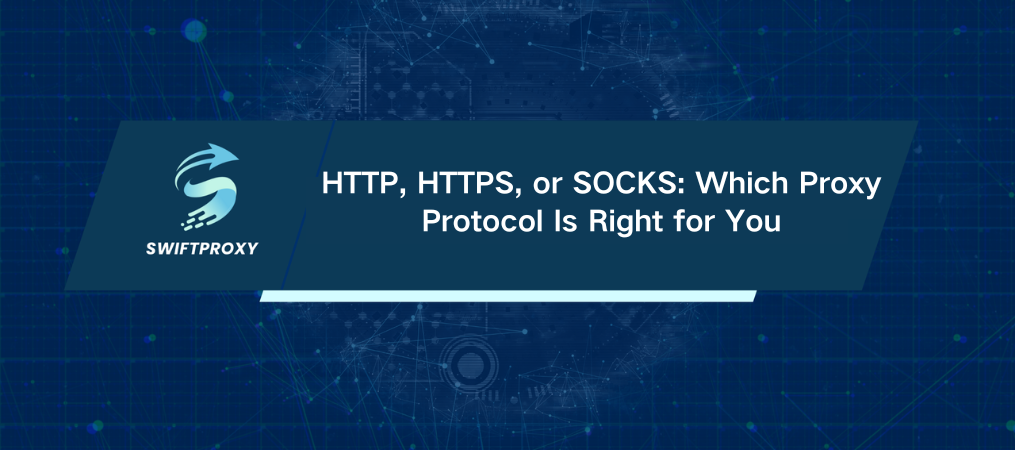HTTP, HTTPS, or SOCKS: Which Proxy Protocol Is Right for You

Did you know that over 80% of online transactions today are encrypted with HTTPS? It's not just a trend; it's the backbone of secure online communication. But how does it all work? Let's take a deep dive into the world of proxy protocols—HTTP, HTTPS, and SOCKS—and uncover how they keep your data flowing smoothly and securely across the web.
What Are Proxy Protocols
Proxy protocols are the silent workhorses behind every secure online transaction. They act as intermediaries between your device and the web, directing traffic, ensuring smooth data flow, and—most importantly—protecting your data. Without these protocols, the internet would be a chaotic, insecure mess of unprotected information.
In simple terms, proxy protocols define how data is transmitted from point A to point B, acting as traffic controllers to ensure messages are safely routed. Whether you're browsing the web, sending emails, or accessing business networks, understanding these protocols helps businesses enhance security, optimize performance, and make smarter decisions in their digital strategies.
HTTP: The Granddaddy of Web Communication
HTTP (Hypertext Transfer Protocol) is the oldest player in the game. It's what powers the majority of web browsing today. When you type a URL into your browser, you're initiating an HTTP request to fetch a webpage. Think of it like sending a letter through the postal service—nothing fancy, just a straightforward way to exchange messages.
However, there’s a catch: HTTP transmits data in plain text. That means anyone with the right tools can intercept that data. Not ideal when you're sharing sensitive information, right? Despite this, HTTP remains popular due to its simplicity and compatibility with older systems. For non-sensitive tasks, like browsing public websites or accessing internal business networks, HTTP can still be a solid choice—fast, easy, and low-maintenance.
HTTPS: The Secure Alternative
Enter HTTPS (Hypertext Transfer Protocol Secure). The "S" stands for secure, and with good reason: HTTPS encrypts the data being sent between your browser and the server using SSL/TLS protocols. That little padlock icon in your browser's address bar? That's HTTPS keeping your data safe.
Encryption isn't just about protecting privacy—it's also about verifying identity. When you use HTTPS, you're not only ensuring your data is safe from prying eyes but also confirming that the site you're communicating with is authentic, not a phishing site in disguise. This is critical for businesses handling sensitive customer information or processing financial transactions.
If you're serious about security, HTTPS should be your go-to protocol. HTTPS proxies provide an extra layer of protection, allowing businesses to inspect encrypted traffic for malicious threats—without breaking the encryption. It's a win-win for both security and performance.
SOCKS: The Swiss Army Knife of Proxies
Now, let's talk about SOCKS (Socket Secure). This is the most flexible protocol of the bunch. Unlike HTTP and HTTPS, which are limited to web traffic, SOCKS can handle just about any type of internet traffic—be it web browsing, email, or even online gaming.
SOCKS operates at a lower level in the networking stack, making it a versatile choice for businesses that need to handle a variety of traffic types. There are two main versions: SOCKS4 and SOCKS5. SOCKS5 is the more advanced option, offering extra features like authentication and support for UDP traffic.
If you need to proxy non-web applications, maintain long-lived connections, or handle large amounts of data, SOCKS is your best friend. It's perfect for businesses that require flexibility and scalability in their proxy solution.
How to Choose the Right Protocol
Choosing the right proxy protocol depends on your specific needs. If you're browsing the web or collecting public data, HTTP proxies might do the trick. For secure online transactions, customer data, or sensitive communications, HTTPS is your best bet. Need something more versatile that can handle a variety of traffic types or bypass certain network restrictions? That's where SOCKS shines.
At Swiftproxy, we offer all three options—HTTP, HTTPS, and SOCKS5—across a range of proxy solutions, including Residential, Datacenter, and Mobile proxies. This gives businesses the flexibility to pick the right tool for the job—whether it's for web scraping, market research, ad verification, or anything in between.
The Evolution of Proxy Protocols
As the digital landscape continues to evolve, so do the protocols that underpin it. HTTPS is becoming the standard for web communication, but the future promises even more advancements. With the rise of IoT, edge computing, and real-time communication, new protocols will need to emerge to meet these challenges. Add in the potential disruptions from quantum computing, and we could see a whole new era of data encryption and security.
At Swiftproxy, we're committed to staying ahead of these changes. We're constantly updating our proxy infrastructure to support the latest security protocols and keep your data safe. Understanding the evolving world of proxy protocols isn't just an advantage—it's essential for maintaining a competitive edge in today's digital world.
Conclusion
Proxy protocols might seem like a technical subject, but they're essential to how we communicate and do business online. By understanding the differences between HTTP, HTTPS, and SOCKS, businesses can make smarter decisions about how they manage and secure their data. Whether you're optimizing SEO strategies, protecting customer data, or collecting valuable market insights, the right proxy protocol is a game-changer.

















































